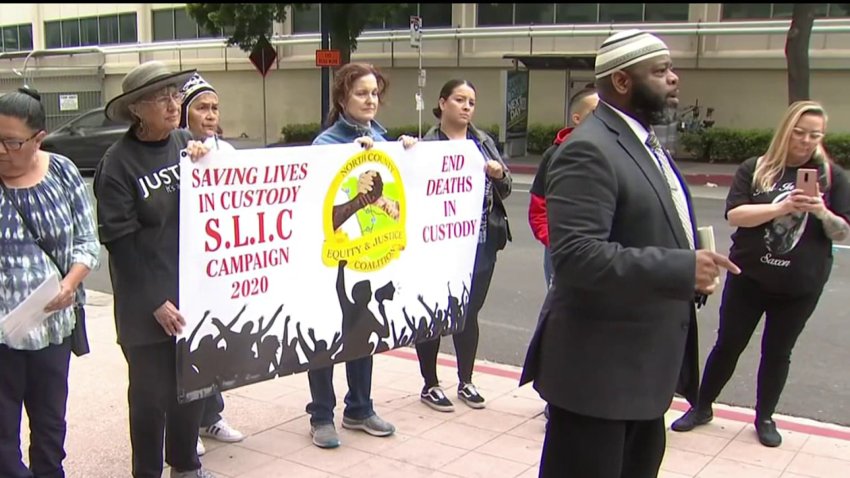NBC 7’s Jackie Crea spoke with Sheriff Kelly Martinez about what changes the department has made since.
The death of a man in a San Diego jail cell one year ago has been ruled a homicide. Lonnie Rupard died just one month after a state audit found the San Diego County Sheriff's Department was not doing enough to prevent inmate deaths. NBC 7 spoke with Sheriff Kelly Martinez about the investigation into this death, and the changes the department has made since.
Martinez has been in office for just about two months and has already been dealing with several issues inside and outside the department. Those incidents include deaths from drug overdoses and alleged neglect, for example.
She’s also heard from the families of those inmates calling for reform right on the front steps of the sheriff’s department headquarters.
Get top local stories in San Diego delivered to you every morning. Sign up for NBC San Diego's News Headlines newsletter.
Amid all those bad headlines, one more: a medical examiner ruling an inmate's in-custody death one year ago a homicide. The report stated that 46 year-old, mentally ill Rupard died from pneumonia, malnutrition and dehydration, among other health issues.
"I feel a lot of compassion for the family in this case in particular. And then also all of the work that we are doing to investigate this now. Having the findings from the medical examiner is the first piece. Now we need to see if there was criminal negligence or culpability involved,” said Martinez.
And in the year since Rupard’s case, Martinez said she has implemented many changes. Some of her top priorities include focusing on staffing, mental health and drug overdoses, for example.
"We have four hundred individuals right now that are unable to make medical decisions for themselves. We've streamlined our process for conservatorship. So that we can make those decisions if we have to. We have wellness teams that check on individuals once or twice a week."
“We do more medical and mental health screening at intake. We do a voluntary urinary screening so we know what drugs or alcohol might be on board when they come into our facilities," said Martinez, referring to the quick action of prescribing withdrawal medications if needed.
Martinez said 82% of men that come into the jails have drugs in their system at booking. The same goes for about 67% of women.
Martinez is open to more, such as implementing body scanning of her staff, even though originally the department wasn’t on board with scanning staff.
"I think it’s been a little bit mischaracterized. I’ve never been opposed to searching our staff if that's needed. Most of the drugs that we are finding, in fact all of the drugs we are finding, are coming in through the people coming into our custody and through the mail. So we are focusing our staffing and our staffing resources on that," said Martinez.
It’s something Paul Parker with the Citizens Law Enforcement Review board has been calling for, hoping it will crack down on drugs in the jails.
“That would be a big change and that’s something if she’s willing to do, that she needs to be commended for doing that,” said Parker.

On Saturday, activists and loved ones of Rupard gathered for a rally.
"We want to make sure that everyone gets the same type of treatment, the same type of transparency, and whatever the outcome of this, if it's appropriate, we want everyone to have appropriate justice," said Yusef Miller, with the North County Equity and Justice Coalition.
Rupard's family declined to speak with NBC 7.
"Please reserve your opinions about these people and what they did and their crimes, reserve that to their humanity and their consitutional rights to not be neglected and die in jail, Miller said.
There has been one recent case of jail employees being charged with the death of an inmate. They are a nurse and a doctor who worked at Las Colinas Detention Facility.
They are facing charges in the death of 24-year-old Elisa Serna in 2019. Investigators said Serna was moved to a medical isolation cell after reporting she was dizzy and nauseous. As the nurse was checking her vitals, prosecutors said Serna fell, but the nurse left her on the floor for an hour.
The nurse was charged with involuntary manslaughter. The investigation also led to charges against a doctor on duty who believed Serna was faking her symptoms. Both have pleaded not guilty, and have court hearings scheduled later this month.




